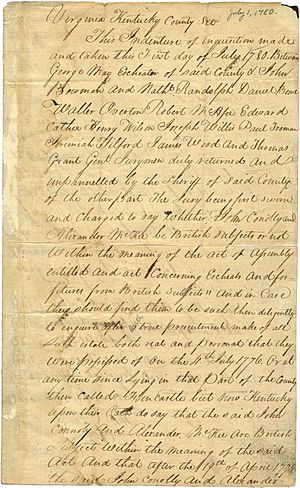Escheat facts for kids
Escheat (say "ess-CHEET") is an old legal idea. It means that if a person dies without any family to inherit their land, that land goes back to the King or Queen (the Crown) or the government. It makes sure that land always has a clear owner and isn't just left empty.
Contents
What Does Escheat Mean?
The word "escheat" comes from a Latin word that means "to fall out." Imagine a piece of land "falling out" of one person's hands and back into the hands of the lord or king.
How Escheat Started in Feudal Times
In old England, during the time of feudalism, the King owned all the land. He would let his followers, called "tenants," use parts of it. These tenants didn't truly own the land, but they had rights to use it.
If a tenant died without any children or family to take over their land, or if they committed a very serious crime, the land would "escheat." This meant it went back to the King or the lord who had given them the land. The King especially liked escheats because it meant more land and money for him!
Why Land Went Back to the King
After the Norman Conquest in 1066, William the Conqueror said all land in England belonged to him. He then shared it with his loyal supporters. These people were "land-holders" or "tenants," not owners. They could pass their land rights to their children.
But if a land-holder died without an heir, it was like the land had no one to use it anymore. So, it would go back to the King.
Escheat could also happen if a tenant was found guilty of a serious crime. The King could take their land. This was a way to punish criminals and also get more land for the Crown.
So, in simple terms, there were two main reasons land would escheat:
- If a person committed a serious crime, their land could go back to the lord or King.
- If a person died without a heir (no family to inherit their land), the land would go back to the King. Today, this idea is often called bona vacantia, meaning "ownerless goods."
How Escheat Was Handled
From the 1100s, the King had special officers called "escheators." They were in charge of managing escheats in different parts of the country.
When a land-holder died, the escheator would gather a group of people (a jury) to find out if there was an heir and how much land the person had. This was called an "inquisition after death." If there was no heir, the escheator would take the land for the King. This made sure the King didn't lose any money from the land.
Escheat Today

Today, the old feudal system of land ownership is mostly gone. But the idea of escheat still exists, though it's called by different names and works a bit differently.
In England and Wales, the old idea of land going back to a feudal lord was stopped in 1925. However, the concept of bona vacantia means that if someone dies without a will and no family can be found to inherit their property, it still goes to the Crown (the King or Queen).
The term "escheat" is now often used when a person dies without a will and no family members can be found to inherit their property. In such cases, their money and property can go to the state or government.
Escheat can also happen with unclaimed money. For example, if a bank account has been inactive for a very long time, and the owner can't be found, the money might be transferred to the state government. This is to make sure that money isn't just sitting there forever without an owner.
In the United States, each state has laws about escheatment. If money or property is unclaimed for a certain number of years (often around five years), it goes to the state for safekeeping. If the original owner is found later, they can usually get their property back from the state.
Escheat in England and Wales Today
Escheat can still happen in England and Wales if a person goes bankrupt or a company is closed down. Sometimes, the official handling the bankruptcy might refuse to take on certain property, especially if it comes with responsibilities (like maintaining a building). If this happens, the property can "escheat" and become land owned by the Crown.
However, often the people living in the property (like flat tenants) have rights to take over the ownership themselves. This is different from bona vacantia, where the Crown automatically gets the property.
See also
- Bona vacantia (ownerless goods)
- Intestacy (dying without a will)
 | DeHart Hubbard |
 | Wilma Rudolph |
 | Jesse Owens |
 | Jackie Joyner-Kersee |
 | Major Taylor |

